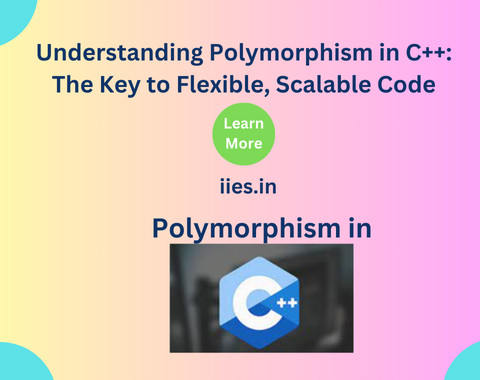Compile-Time Polymorphism:
Also known as static polymorphism, this type is achieved in C++ through function overloading and operator overloading.
Function Overloading:
This occurs when functions share the same name but different in parameter types or the number of parameters. This enables the same function name to perform different tasks depending on the arguments used.
Operator Overloading:
In C++, operators like +, *, etc., can be redefined to perform customized actions based on the type of operands. For example, arithmetic, assignment, and logical operators can be overloaded. However, some operators, like the scope resolution operator (::) and the sizeof() operator, cannot be overloaded.
Runtime Polymorphism:
Runtime polymorphism is implemented primarily through inheritance and virtual functions.
Virtual Functions:
A virtual function in a base class allows derived classes to provide their own implementation for the function. This makes it possible for the same function call to execute different functions, depending on the object type. Virtual functions allow for dynamic behavior and are essential for achieving runtime polymorphism in C++.
Pure Virtual Functions:
These functions, declared with = 0 in the base class, have no implementation in the base class. Any class containing at least one pure virtual function is considered an abstract class, which cannot be instantiated directly. Abstract classes serve as templates for derived classes, which must implement the pure virtual functions to define specific behaviors.
Advantages of Polymorphism in C++
Code Reusability: Polymorphism allows different classes to use a shared interface, reducing redundancy by eliminating the need for repeated code.
Simplified Maintenance:
Writing generalized code with polymorphism makes maintenance easier. Changes to a base class generally don’t require changes in derived classes, making debugging and updating more manageable.
Enhanced Flexibility:
Polymorphism allows objects to change behavior dynamically based on context, which is especially useful for systems where object types may vary at runtime.
Scalability:
Polymorphism facilitates adding new classes or extending functionality without altering existing code, making it ideal for scalable applications.
Supports Abstraction:
By allowing base classes to define interfaces that derived classes implement, polymorphism separates the “what” from the “how” of operations, promoting better modularity.
Encourages Loose Coupling:
Interactions through a common interface reduce dependencies on specific implementation details, resulting in more modular code that is easier to test, extend, and maintain.
Disadvantages of Polymorphism in C++
Increased Complexity:
Polymorphism, particularly with virtual functions and inheritance, can make the code more complex, making it harder to trace errors or understand program flow.
Higher Memory Usage:
Runtime polymorphism depends on virtual tables (vtables) and virtual pointers, which consume additional memory and may not be ideal for resource-limited applications.
Performance Overhead: Virtual functions use dynamic binding, which can slow down performance slightly, especially in performance-critical applications.
Challenging Debugging:
Debugging polymorphic code can be difficult due to layers of abstraction, particularly when inheritance and virtual functions are heavily used.
Potential for Misuse:
Overusing polymorphism, such as creating unnecessary abstract classes or complex inheritance hierarchies, can lead to overly complicated code that’s hard to manage.
Reduced Compile-Time Checking:
Errors in runtime polymorphism, like calling non-existent functions, only appear at runtime, potentially leading to harder-to-catch bugs.

